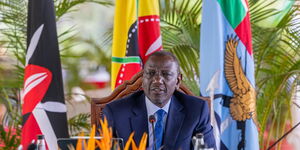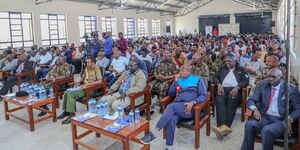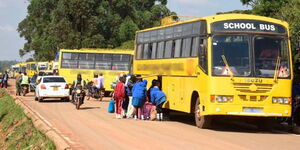Friday, March 13, 2020, marked the beginning of a constrained period in Kenya when Health Cabinet Secretary Mutahi Kagwe announced the first confirmed Covid-19 case in the country.
At a time when the world is grappling with the surge in the number of infections and the rise in deaths, 55 days into the pandemic in Kenya, 29 people had succumbed to the deadly microbe.
"I am equally saddened to announce that we have lost three other patients. 2 are from Nairobi and 1 from Mombasa. This takes the number of lives lost to 29," Health CAS Rashid Amin announced on Thursday, May 7, 2020.
Unfortunately, the pandemic coincided with ravaging floods resulting from the heavy rains that have been experienced across various parts of the country.
Devolution CS Eugene Wamalwa on Wednesday, May 6, 2020, revealed that 194 people had succumbed in the course of the heavy rains.
"Since yesterday, we have lost 30 people in the last 44 hours. Now in total 194 lives have been lost," CS Wamalwa had stated. This has since raised questions on which poses a major threat to members of the public.
Prevention measures against floods
The government has on several occasions been called out for the measures put in place in ensuring lives are not lost to floods on a recurrent basis.
On November 23, 2019, heavy rainfalls that hit the country resulted in massive landslides that caused over 65 deaths in the country. Less than six months later, the country is grappling with yet another and much worse disaster.
Senate Majority Leader Kipchumba Murkomen on April 21, 2020, tasked the government to reveal its plan in ensuring victims of the disaster are accounted for, compensated and relocated.
As much as he commended the government in the efforts to rescue the affected persons, he had noted that a majority of the search and rescue missions had been left to members of the public.
"While I appreciate the effort from the government, I believe that much more should be done to manage the situation, including putting in place measures to relocate the population to safer grounds and to upgrade the environment to prevent further incidences of this nature from happening," Murkomen had stated.
As of May 6, the most affected areas in the country were around River Nyando, River Nzoia, River Tana and parts of Elgeyo Marakwet and West Pokot.
Interior CS Fred Matiang'i on May 6, warned that security officers would move into the flood-prone areas and forcefully evict people if they failed to adhere to directives issued by the national government so as to avoid further casualties.
“We have no option but to move them out by force. This is a disaster and we cannot keep pleading with our people to move out, we must move them out," Matiang'i pronounced.
Prevention measures on Covid-19
The government has in response to the Covid-19 pandemic issued several contingency measures to shield members of the public from the adversities of the virus.
On March 25, 2020, President Uhuru Kenyatta first declared a nationwide dusk to dawn curfew, followed by a 21 day extention on April 26, 2020, as a way to minimise interaction between persons, and stem the spread of the virus.
Other that than the directive to stay at home, and appeal to employers to allow for Kenyans to work from home, the government issued an order for members of the public to always wear face masks, and social distance while in public places, failure to which attracts legal action.
"Every person who is in a public place during the restriction period, shall maintain a physical distance of no less than one metre from the next person; and use a proper face mask that must cover the person’s mouth and nose. A person who contravenes these sub-rules commits an offence," an excerpt of the Gazette signed by CS Kagwe on April 6, 2020 reads in part.
With the increase in cases in the country, and some areas more affected than others, President Kenyatta on May 6, moved to lock down Nairobi's Eastleigh Estate, along with Mombasa's Old Town, after they were earmarked as Covid-19 hotspots.
Conclusion
Though floods may have claimed more lives than Covid-19, as of May 7, 2020, the virus poses a major threat to the country, having resulted in a global economic recession.
The World Health Organisation on March 19, 2020 declared Covid-19 a global pandemic after it was confirmed in most countries of the world.
As defined, by WHO, a pandemic is a disease prevalent in the whole world, or a country. This, therefore, makes the virus deadlier as opposed to floods, which only affect a specific area from time to time.












